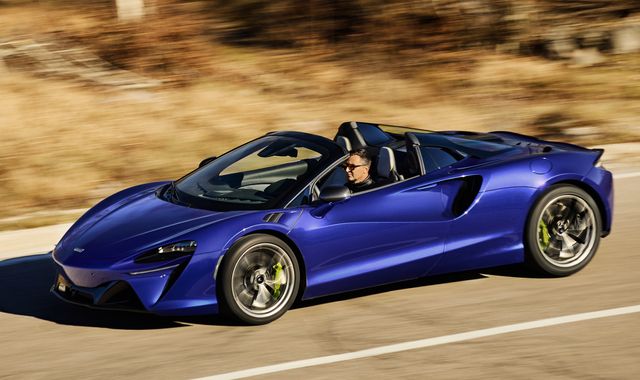On Air Now
Heart's Club Classics with Pandora Christie 7pm - 11pm
25 April 2024, 10:06 | Updated: 25 April 2024, 11:39

McLaren Group, the British supercar maker and Formula One team-backer, has given lenders signs of an improvement in its financial performance even after a £375m impairment charge propelled it to a record loss last year.
Sky News has learnt that McLaren has told bondholders that it made losses of £873m in the 12 months ending December 31.
The Woking-based company's financial travails reflected an ongoing financial restructuring that was completed earlier this year.
Mumtalakat, Bahrain's sovereign wealth fund, has taken full ownership of the group, and is now engaged in talks about technology partnerships which could lead to the sale of a minority equity stake in McLaren.
According to the results, which have not yet been released publicly, it recorded a £375m non-cash impairment charge to reflect asset writedowns relating to production problems.
In the first quarter of the 2024 financial year, however, McLaren reported its best quarter for nearly five years, with an underlying profit of £3m on revenues which rose by 52%.
McLaren Reports Underlying First Quarter Profit as Revenues Rise 52%
McLaren Group has filed solidly improved financial results for the first three months of 2024 with EBITDA rising £30m to £3m, reversing underlying losses in the same period of 2023, with revenues up by 52%.
Responding to an enquiry from Sky News, McLaren said its start to the year reflected a 28% increase in wholesale volumes with its 750S model sold out into 2025 and orders for the GTS ahead of expectations.
Paul Walsh, McLaren's executive chairman, said: "These results demonstrate the strong fundamentals in our business, where demand for our iconic high-performance luxury sports cars exceeds supply, and where our outlook is improving following major transformation actions over the past year.
"We can look forward to a bright future with a simplified shareholder structure, a clean balance sheet and significant opportunities to forge partnerships to drive future growth."
In an attempt to drive sales growth, McLaren has expanded its retail network with the opening dealerships in Australia, Japan and the brand's largest showroom in Dubai.
McLaren, whose road car models also include the Artura Spider, P1 and Senna, has seen some of its former shareholders taking warrants which would benefit from a future 'liquidity event' such as an initial public offering or sale of the company.
McLaren Racing, the division which directly houses the F1 and other racing operations, has its own external shareholders following a deal struck during the pandemic.
Simplifying its structure should pave the way for a technology partnership with an automotive original equipment manufacturer (OEM) in the coming years as McLaren transitions towards becoming a hybrid and electric vehicle company.
Read more from business:
Sainsbury's profits rise
Sales down at Nestle after price hikes
Labour promises publicly owned rail
During the COVID-19 pandemic, the company was forced into a far-reaching restructuring that saw hundreds of jobs axed and substantial sums raised in equity and debt to repair its balance sheet.
Its finances became so strained that it repeatedly tapped Mumtalakat for new funding, as well as striking a sale-and-leaseback deal for its spectacular Surrey headquarters.
In 2021, it also sold McLaren Applied Technologies, which generates revenue from sales to corporate customers.
Founded in 1963 by Bruce McLaren, the group's name is among the most famous in British motorsport.
During half a century of competing in F1, it has won the constructors' championship eight times, while its drivers have included the likes of Mika Hakkinen, Lewis Hamilton, Alain Prost and Ayrton Senna.
In total, the team has won 180 Grands Prix, three Indianapolis 500s and the Le Mans 24 Hours on its debut.
The company saw its separate divisions reunited following the departure in 2017 of Ron Dennis, the veteran McLaren boss who had steered its F1 team through the most successful period in its history.
Mr Dennis offloaded his stake in a £275m deal following a bitter dispute with fellow shareholders.
(c) Sky News 2024: Supercar maker McLaren hit by £375m impairment charge